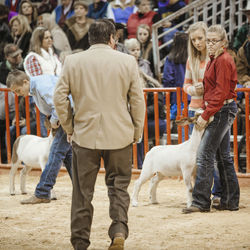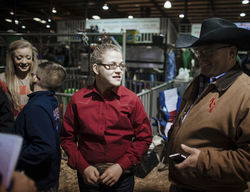Blindness Won't Stop These Twins From Showing Their Goats at the Rodeo
Faith and Caleb Snapp and their parents haven't let anything stop them.

It was time to prepare the goats. Faith Snapp, 12, stepped into the pen and slid her hand along the rump of cream- and toffee-colored Mac, checking to make sure he was clean. Her twin brother, Caleb, stood in the corner feeding Pi his formula while the twins' parents and sister scurried around getting ready for the San Antonio Livestock Show. Faith tossed back her long blond hair, while Caleb, a couple of inches shorter than Faith, clambered onto the gate to get out of the way.
This is old hat for the twins and the rest of the Snapp family. Working with livestock and a love of animals are two of the things Brent and Angie Snapp had in common when they met in college more than 20 years ago. Since then they've tried to pass those passions on to their children. Faith and Caleb have been making the rounds of the livestock-show circuit since third grade, and their older sister, Jacey, 15, started competing at an even younger age. When Jacey said she wanted to try her hand at raising goats, the whole family got into it.
The twins grew up helping their big sister with her animals out in Lubbock — where the family lives — and when they were old enough, they were eager to get out there in the ring and compete on their own. The family travels six months out of the year, crisscrossing Texas to enter livestock shows and jackpot competitions. They hit all the big shows — San Antonio, Dallas, Austin — and as many of the small ones as they can. It gives the twins a chance to get out in front of audiences, and Angie has watched as over the years they've gone from being shy and uncertain to stepping out with absolute assurance in themselves and the goats they are leading. "This teaches them so much. They learn responsibility in caring for their animals, and they've gained so much confidence," Angie said.


Related Stories
 World Cup Fever in Houston, and You Still Have Time to Catch It (VIDEO)June 25, 2014
World Cup Fever in Houston, and You Still Have Time to Catch It (VIDEO)June 25, 2014 Life Hacks: Armed With Smartphones, Young Houston Entrepreneurs Work to Live, Not Live to WorkDecember 2, 2014
Life Hacks: Armed With Smartphones, Young Houston Entrepreneurs Work to Live, Not Live to WorkDecember 2, 2014 The Top 10 Country Stars Who Live In TexasNovember 28, 2014
The Top 10 Country Stars Who Live In TexasNovember 28, 2014 65th Annual H-E-B Thanksgiving Day Parade: Houston on ParadeNovember 27, 2014
65th Annual H-E-B Thanksgiving Day Parade: Houston on ParadeNovember 27, 2014 Houston's 10 Best Bars For Out-of-Town GuestsNovember 27, 2014
Houston's 10 Best Bars For Out-of-Town GuestsNovember 27, 2014
More About
This month Faith and Caleb will be competing at the Houston Livestock Show for the fifth year in a row. They're a familiar sight in the goat world, as those who show animals call it. They aren't identical, but they're both skinny kids with pale blue eyes that look blurry behind thick, concave glasses.
The glasses are the only visible clue that the twins can't see. They've been legally blind since birth, and when they walk into the ring, there's always a spotter at each twin's side to whisper instructions about where to place the goat and where to look.
But this isn't the Paralympics. They don't compete in a separate category. While other contestants are checking out the competition, moving around to catch the judge's eye by staring directly into his face, watching out for any potential accidents in the making — there are often 100 goats in the ring at the same time — Faith and Caleb see everything as if they're peering at the world through a coffee straw, discerning only blurry shapes and pinpricks of color and light.
And yet somehow, that is enough.
_____________________
They can see a little. Faith's eyes are worse than Caleb's because her right eye is only living tissue now, though Caleb is losing more sight because his cataracts are more severe. The twins were born with an eye disease that is a common risk among premature babies. With the disease, the blood vessels that connect the retinas to the rest of the eye don't finish developing. Angie had a difficult time during her pregnancy with older daughter Jacey, and then a few years later with the twins. Because of complications due to Graves' disease, she became diabetic during her pregnancy with Jacey. It's difficult to carry twins to term under the best of circumstances, but Angie made it to only 26 weeks before her water broke. The birth was delayed to give the twins more time in the womb, but they came a week later, 13 weeks premature.
They were tiny, fragile-looking things in their incubators, so small they had to be dressed in doll clothes. When babies are born that early, retinopathy of prematurity is such a common risk that doctors always check for it. Brent and Angie found out three weeks after Faith and Caleb were born that the twins had the disease. They had their first operations in Houston when they were nine weeks old, laser surgery to sever the blood vessels in an attempt to save their vision. It was the first of many surgeries, many doctors' appointments and trips to Houston.
"It was a hard time for us. The first two years after they were born, it was all doctors' appointments. If Brent and I hadn't been so solid in our marriage, I don't know how we'd have survived it," Angie said.
Because their retinas were surgically detached, Faith and Caleb have no peripheral vision. Their sight is so poor that it didn't change significantly after cataracts started growing a few years ago. Angie understood they couldn't see much as babies, but she didn't begin to understand what the world looked like through their eyes until they were old enough to color and try to draw the world around them. Faith and Caleb would present their mother with drawings of people, but the people didn't have any noses. She realized they didn't draw noses on their people because they had never seen noses.
Now Trending
Around The Web
-
 How the U.S. Chamber of Commerce became the greatest (bumbling) enemy of America.
New Times Broward-Palm Beach
How the U.S. Chamber of Commerce became the greatest (bumbling) enemy of America.
New Times Broward-Palm Beach
-
 The Government of Free Vietnam Is No Republic for Old Men
OC Weekly
The Government of Free Vietnam Is No Republic for Old Men
OC Weekly
-
 Fifteen Things You Didn't Know About Ryan Getzlaf
OC Weekly
Fifteen Things You Didn't Know About Ryan Getzlaf
OC Weekly
Houston Press on Facebook
Special Reports
-
My Account
Log In
Join -
Connect
Facebook
Twitter
Newsletters
Things To Do App -
Advertising
Contact Us
National
Agency Services
Classified
Infographics
-
Company
Privacy Policy
Terms of Use
Site Problems?
Careers







































